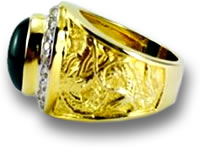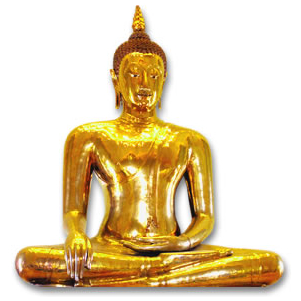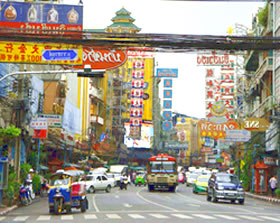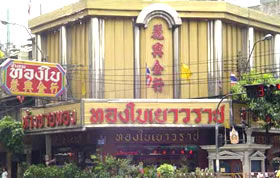Thai Gold in Bangkok and Urban Gold Diggers

|
| Finely Carved Thai Gold Ring with Agate Cabochon |
Gold is a universally valuable commodity that is treasured all over the world. It is used for trade and in the making of jewelry and other ornaments. We all know that gold is mined from veins in the bowels of the earth and then alloyed and fashioned by goldsmiths. However, there is a link in the gold industry chain that is not as well-known, the underbelly of industry that is devoted to the gold that falls through the cracks in the system and trickles down the chain to opportunists in the community.
Gold has been an important aspect of the history of Thailand. In fact, Bangkok Airport, Suvarnabhumi (pronounced Soowannapoom) comes from Pãli language meaning "Golden Land". This was referred to in ancient Indian texts, but the location is a matter of debate. The ancient name for Thailand, Siam, is said by some to have come from this term, but by others, it is said to have come from the Sanskrit for "dark". Since the Thai people are generally not fans of tanning, they would prefer to have a more precious meaning for the name of their treasured home.
 |
| The World's Largest Solid Gold Buddha Statue |
Before the reign of King Rama V in the 1800s, gold was considered a noble metal that was not permitted to be worn by ordinary Thais. However, nowadays, the Thai public enjoys the luxury of gold jewelry. Thailand is a hub for gold trade, particularly a district of Bangkok known as Yaowarat, or Chinatown. As the name suggests, Yaowarat is the area of Bangkok that was settled by the Chinese around 200 years ago. It is an old and eclectic part of Bangkok where visitors can enjoy good food, smell the perfume of a huge fresh flower market, get lost in the "Thieves Market", see crocodiles or the world's largest solid gold Buddha at a temple, buy traditional Chinese medicine or choose fine gold jewelry from over 130 gold shops.
Gold has been traded in Chinatown since the time of King Rama V, when foreign trade flourished under his reforms. The gold of Yaowarat is now sourced from places all over the world. Some gold is mined in Thailand, from Loei, Phichit, Kabinburi and Prachinburi and the rest is imported. Gold is one of the top 5 items exported and imported by Thailand. Both the domestic and international demand for Thai gold has risen in recent years due to the unstable Thai baht and rising export to Asian countries. According to the London based World Gold Council, Thailand produced 5.3 tons of gold in 2013, with a world ranking of 48. However, Thailand's gold consumption was 165.4 tons in 2013, which is 5th in the world.
 |
| Chinatown in Bangkok |
Thai gold is sold by the "baht" weight. The baht is the Thai currency and the weight of a 1 baht coin is equivalent to 15.2 grams of gold bullion. Thai gold is internationally recognized as having a high level of purity and quality craftsmanship. Additionally, the cost of labor is low. The gold can be bought in various forms, including bars, biscuits, coins and jewelry. The intricately detailed gold jewelry is made by highly skilled goldsmiths, often painstakingly by hand.
Although the goldsmiths of Chinatown do their best to prevent any loss of the precious material, by introducing measures such as having workers rinse their hands in large bowls of water before leaving, gold dust and minute gold filings inevitably find their way out of the workshops and onto the streets.
It is said by Thais that any rubbish coming from the waste baskets of the gold shops does not touch the ground, but is already reserved to the highest bidder before it reaches outside dustbins. Carpet and floor sweepings are sold as rich pickings. Old carpets are likewise not discarded, but snapped up by those who intend to extract every last speck of gold that could not be vacuum-cleaned out over the years.
 |
| A Prominent Gold Shop in Chinatown, Bangkok |
The streets are not paved with gold, but the contents of the canals, drains and sewers of Yaowarat are flecked with tiny specks of the precious substance. The silt from these places is collected by poor, but entrepreneurial people who either sell the material on to be processed elsewhere, or painstakingly filter out the precious gold, and refine it using heat and then acid.
The gold scavengers work in the early hours of the morning to collect the sludge and silt from the drains, canals and sewers of Chinatown. Some of the people who harvest the dross come from the impoverished northeast of Thailand, where it is difficult to support a family from farming. They scoop the silt up just before dawn, put it into sacks and then process it while the rest of the city dwellers go about their day. Once the gold has been refined, it is sold to one of the numerous brokers in the area, who display buying and selling rates in the shop windows.
The gold scavengers of Bangkok can earn enough to get by, in some cases enough to live comfortably or to return to their village. But they would be likely to feel the effect of any downward fluctuation in the price of gold more than the rest of us.
|